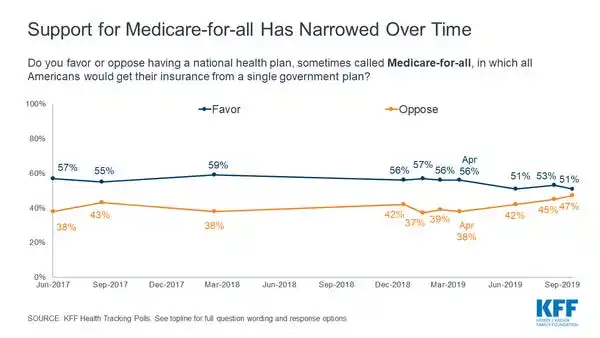简体中文
繁體中文
English
Pусский
日本語
ภาษาไทย
Tiếng Việt
Bahasa Indonesia
Español
हिन्दी
Filippiiniläinen
Français
Deutsch
Português
Türkçe
한국어
العربية
How Bernie Sanders and Elizabeth Warren's progressive alliance ends
Abstract:Sens. Bernie Sanders and Elizabeth Warren have maintained solidarity on the left flank of the 2020 Democratic field. But that has to end eventually.
Sens. Elizabeth Warren and Bernie Sanders are longtime political allies and friends, which is why they haven't yet attempted to undermine one another in the Democratic presidential primary.
But if the two 2020 frontrunners remain in the race, they'll eventually be forced to criticize each other's positions and records.
There are a few fault lines that run through the Warren-Sanders relationship, most notably concerning their positions on capitalism vs. democratic socialism.
Warren has called herself “a capitalist to my bones” and believes well-designed rules and regulations can make capitalism work for everyone. But Sanders has long described himself as a democratic socialist and believes capitalism is fundamentally unsustainable.
Fellow 2020 candidates — or voters themselves — might eventually push Sanders and Warren to debate their differing positions on our economic system.
Visit Business Insider's homepage for more stories.
Sens. Elizabeth Warren and Bernie Sanders are longtime political allies and friends, which is why they haven't yet attempted to undermine one another in the Democratic presidential primary.
The two have similar positions on a range of policies and are the most progressive candidates in the 2020 race. And during July's Democratic debate, they teamed up against more moderate candidates to defend their similar visions. They'll likely attempt to do the same at Thursday's debate in Texas.
“Elizabeth and I end up agreeing on a lot of issues,” Sanders said at an April town hall.
But there are some key differences between the two that could become more exposed as the primary continues.
On healthcare, Sanders wrote the Medicare-for-all legislation that Warren co-sponsored.
But Warren was slow to fully endorse Sanders' vision on the campaign trail, sticking to talk of “universal,” rather than “single payer” care. And given the many detailed plans Warren has unveiled throughout her campaign, the fact that she doesn't have her own healthcare agenda is notable.
The two New Englanders also disagree on a few key issues related to democratic reform. While Warren would get rid of the Senate filibuster and is open to growing the size of the Supreme Court, Sanders is opposed to both.
And on a more philosophical level, Warren and Sanders also position themselves differently. Warren has called herself “a capitalist to my bones” and believes well-designed rules and regulations can make capitalism work for everyone. But Sanders has long described himself as a democratic socialist and believes capitalism is fundamentally unsustainable.
“For a number of reasons — alienation and disengagement among the electorate, and the extraordinary power of big business and finance over government — [Sanders] doesn't believe that even the cleverest, most uniformly applied regulations will solve what he views as a political and economic crisis,” Washington Post columnist Elizabeth Bruenig wrote in June.
While Sanders has long called for “a political revolution,” Warren is running on “big structural change.”
This fundamental difference will likely, at some point in this primary, come to the fore. Some Sanders' supporters, while sympathetic to Warren, believe that Sanders' vision for a grassroots revolution is key to beating Trump and changing the country's direction.
“Though Warren is an ally of many progressive causes, the best chance that we have to not just construct some better policy, but reconfigure a generation of American politics lies with Sanders running and capturing both the Democratic primary and the presidency,” Bhaskar Sunkara, editor of the far-left magazine Jacobin, wrote in The Guardian last year.
Meanwhile, many Democratic voters haven't signed on to democratic socialism and will push Warren to emphasize her faith in markets.
Disclaimer:
The views in this article only represent the author's personal views, and do not constitute investment advice on this platform. This platform does not guarantee the accuracy, completeness and timeliness of the information in the article, and will not be liable for any loss caused by the use of or reliance on the information in the article.
Read more
Trump record high employment, jobs boast is meaningless for key reason - Business Insider
The boost in the number of employed Americans largely tracks with the nation's sluggish population growth as Americans come of age and start working.
Billionaires like Bezos, Gates fortunes after Warren, Sanders wealth tax - Business Insider
Sanders and Warren aim to sharply curb the economic power that the super-rich have amassed in recent decades and use their money to fund new programs.

The debate was about Elizabeth Warren because the election is now about Elizabeth Warren - Business Insider
Lots of candidates went after Sen. Elizabeth Warren, and lots of candidates went out of their way to defend Sen. Elizabeth Warren. Here's why.

Bernie Sanders' Medicare for All plan is getting less popular: poll - Business Insider
The decline in support suggests that repeated attacks over the sweeping proposal's costs and its end of private insurance may be taking a toll.
WikiFX Broker
Latest News
Exposing the Top 5 Scam Brokers of March 2025: A Closer Look by WikiFX
Gold Prices Climb Again – Have Investors Seized the Opportunity?
Webull Launches SMSF Investment Platform with Zero Fees
Australian Regulator Warns of Money Laundering and Fraud Risks in Crypto ATMs
The Withdrawal Trap: How Scam Brokers Lure Victims into Paying More
FCA to Investors: Think Twice Before Trusting These Brokers
Trump\s tariffs: How could they affect the UK and your money
Trump gambles it all on global tariffs he\s wanted for decades
HTFX Spreads Joy During Eid Charity Event in Jakarta
How Will the Market React at a Crucial Turning Point?
Currency Calculator








